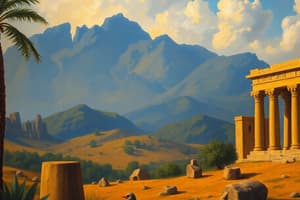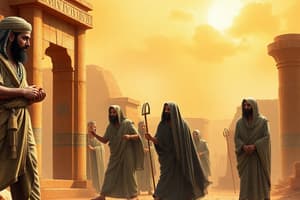Podcast
Questions and Answers
Match the following civilizations with their contributions:
Match the following civilizations with their contributions:
Mesopotamians = Developed advanced irrigation techniques Egyptians = Developed one of the earliest recorded writing systems, hieroglyphics
Match the following civilizations with their mathematical contributions:
Match the following civilizations with their mathematical contributions:
Mesopotamians = Developed groundbreaking astronomical theories Egyptians = Developed architectural advancements in building structures
Match the following civilizations with their geographical locations:
Match the following civilizations with their geographical locations:
Mesopotamians = Along the Tigris and Euphrates rivers Egyptians = In the Nile River valley
Match the following civilizations with their governmental advancements:
Match the following civilizations with their governmental advancements:
Match the ancient civilization with its architectural achievement:
Match the ancient civilization with its architectural achievement:
Match the ancient civilization with its contributions to mathematics:
Match the ancient civilization with its contributions to mathematics:
Match the ancient civilization with its artistic heritage:
Match the ancient civilization with its artistic heritage:
Match the ancient civilization with its advancements in writing system:
Match the ancient civilization with its advancements in writing system:
Flashcards are hidden until you start studying
Study Notes
Diverse Paths of Human Civilization
Throughout history, humanity has shown a remarkable capacity for invention, adaptation, and progress. Our story is a tapestry woven with the threads of countless ancient civilizations, each contributing unique patterns of learning, innovation, and tradition. Let's trace the footsteps of these civilizations, uncovering the foundations of our shared history.
The Mesopotamians
Along the fertile banks of the Tigris and Euphrates rivers, a civilization emerged that would shape the future of human achievements. The Sumerians, Assyrians, and Babylonians created the first known writing systems, including cuneiform. They also developed advanced irrigation techniques, fostering agriculture and urban settlements. Their mathematical and astronomical theories were groundbreaking, with the Babylonians creating the earliest known system of arithmetic and an accurate solar calendar.
The Egyptians
The Nile River valley provided the setting for the ancient Egyptians' impressive civilization, who built monumental structures such as the Pyramids of Giza, the Great Sphinx, and the Valley of the Kings. The Egyptians created a strong centralized government and developed one of the earliest recorded writing systems, hieroglyphics. Their knowledge of medicine, agriculture, and architecture contributed greatly to our understanding of human history.
The Indus Valley Civilization
The Indus Valley, stretching from present-day Pakistan to northwestern India, hosted the Indus Valley Civilization, one of the earliest and most advanced urban communities. Their settlements, such as Mohenjo-daro and Harappa, were well-planned and organized, with features like sewage systems, public baths, and underground bakeries. Their standardization of weights and measures, as well as their use of terracotta seals, illustrates a skilled and efficient trading network. The exact purpose of their numerous seals and the nature of their script remain a fascinating enigma for modern scholars.
The Maya Empire
The ancient Maya, centered in present-day southern Mexico, northern Guatemala, and western Belize, were an innovative civilization. They developed a sophisticated writing system, complex astronomical observations, and advanced mathematical calculations. Their achievements in architecture, such as the stepped pyramid at Tikal and the Temple of the Inscriptions at Palenque, are testaments to their architectural skill. The Maya also left behind a rich artistic heritage, including sculptures, pottery, and murals.
The Greeks
The ancient Greeks were a civilization that thrived in city-states, a form of government that would have a profound impact on the future of Western societies. Their philosophical inquiries, such as those of Plato and Aristotle, gave rise to the foundations of Western thought. The Greeks also made significant contributions to mathematics, notably with the work of Pythagoras, Euclid, and Archimedes, and to science, as illustrated by the discoveries of Archimedes and the works of Galen and Hippocrates in medicine.
As we have journeyed through the centuries and continents of this grand historical tapestry, we have seen the common threads of human achievement, from the first written languages to the birth of democracy. These ancient civilizations serve not only as testaments to our past but also as reminders of the limitless potential that lies within us as we continue to explore, learn, and grow.
Studying That Suits You
Use AI to generate personalized quizzes and flashcards to suit your learning preferences.




